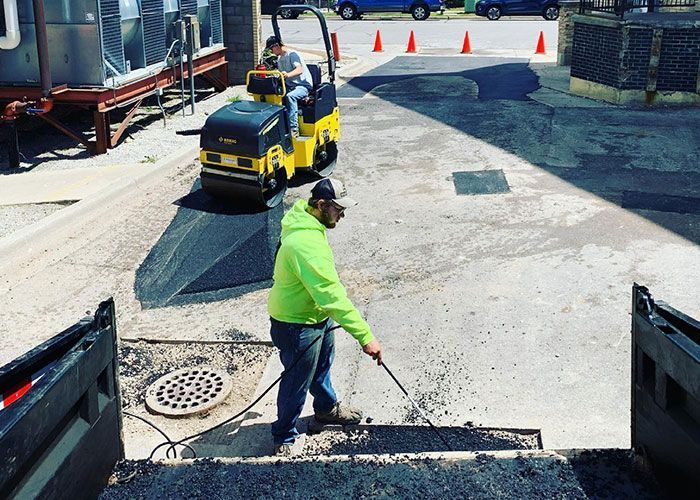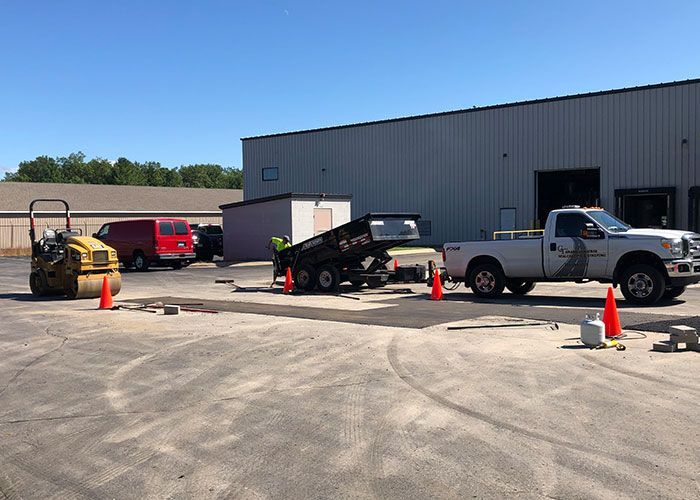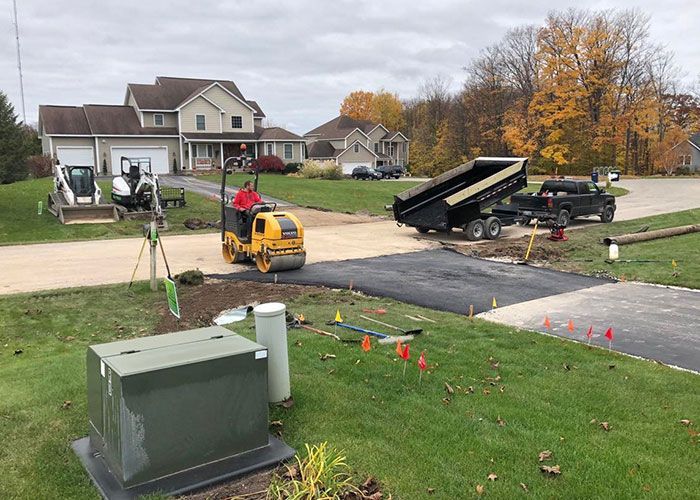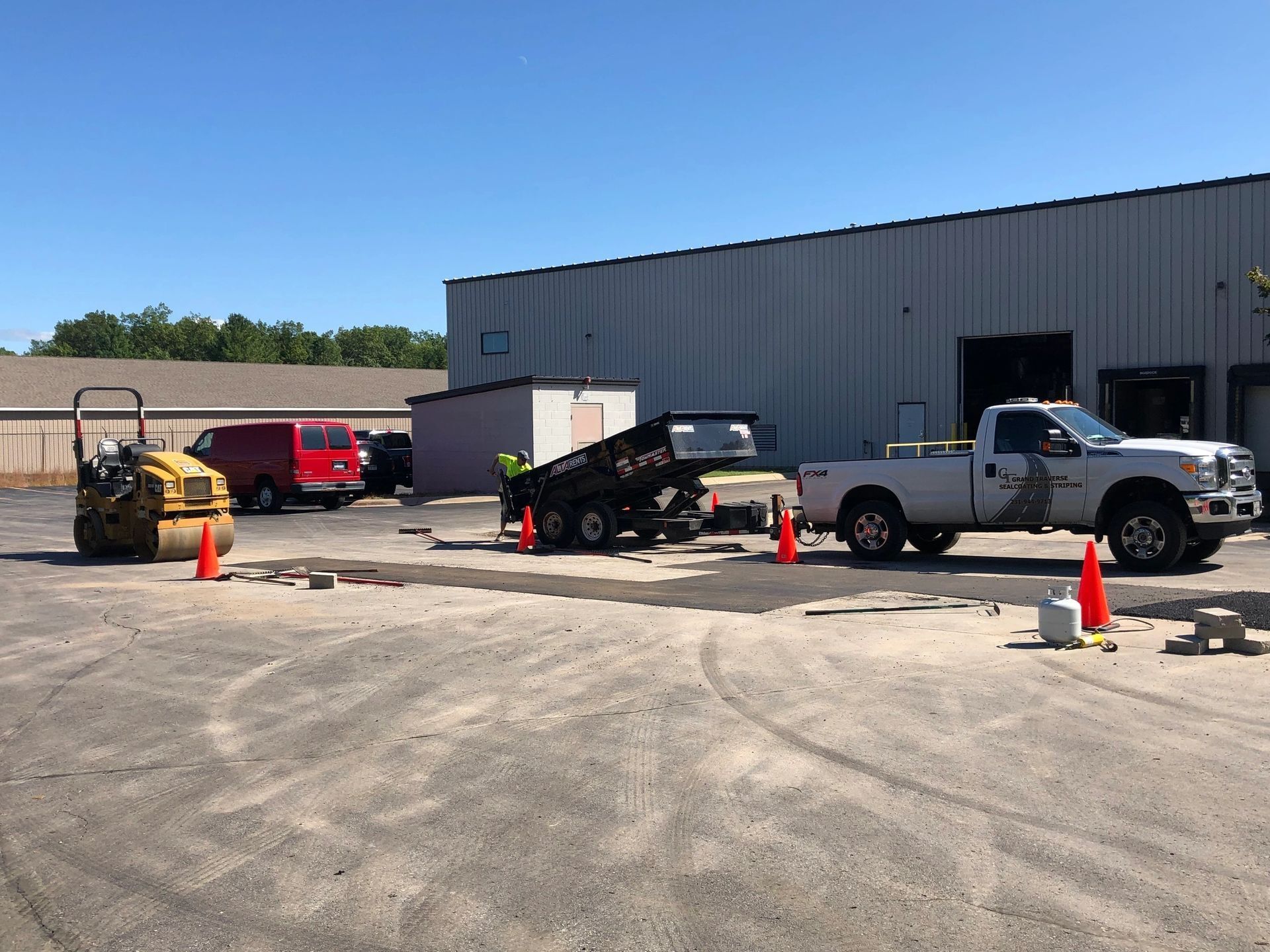Traverse City & Northern Michigan Asphalt Repair Experts
Revitalize Your Pavement with Reliable Asphalt Repair Services in Traverse City and Northern Michigan

What Causes Potholes In Traverse City Asphalt?
There are many things to consider when making asphalt repairs or patches, especially with Traverse City's freeze and thaw cycles. First of all, you need to determine what caused the damage. Ultraviolet rays and water damage are the two leading causes of asphalt damage, followed by vehicle traffic wear and tear.
Ultraviolet rays may lead to cracks in the asphalt as it breaks down the asphaltic material. However, sealcoating greatly helps prevent asphalt breakdown. These cracks allow water to penetrate the asphalt making the sub-base material saturated and washed out if they aren't sealed. If the base material is washed out from underneath the asphalt, the asphalt will fail resulting in a pothole.
If you have potholes and cracks in your Grand Traverse area residential or commercial asphalt, have our asphalt repair specialists address those issues right away to keep your property safe and accessible and avoid the expense and downtime of replacing your parking lot, driveway, or road.

How Do You Repair My Traverse City Asphalt?
To fix the damaged asphalt or potholes in your Traverse City area asphalt, we saw cut around the perimeter. Next, we clean out the asphalt and materials present in the affected area, ensuring that the area is clean and free of debris.
To ensure a proper foundation for the new asphalt base material, we have to remove all the wet sub-base materials, if any are present. After removing the wet materials, we replace the area with a new compactable material like crushed stone or road base aggregate. Depending on the depth and size of the affected area, it may be necessary for us to compact the new material in multiple lifts.
Once we have placed the proper compaction base material, we apply a tack coat, the tack coat ensures adhesion between the new asphalt and the base material.
After these steps have all been completed, we can now install the new asphalt. The new asphalt material is installed at the same depth as the existing asphalt. To ensure that the asphalt patch area matches the elevation of the existing asphalt, we spread the new asphalt approximately a 1/4" higher than the existing asphalt. We than use a smooth ride-on drum roller or vibratory plate compactor with water, depending on the size of the patch area, to achieve the proper compaction rating for the new asphalt.
We then use a blower and sweeper to clean up the work area and remove all the excess debris. To complete the pothole repair, our repair team applies hot rubberized crack sealer around the perimeter of the patch to prevent water from seeping in between the existing pavement and the patch, causing the pavement to once again fail.

Residential Asphalt Repair Services In Traverse City, MI
We offer premium quality asphalt pothole patching, repair, and crack sealing services to homeowners, investors, and property managers to help you keep your Traverse City area residential property safe, attractive, and lasting.
If your driveway, roadway, parking lot or other asphalt surfaces are in need of repair, you can count on our expertise to restore them quickly for a reasonable price.
Our Traverse City Asphalt Repair Process
1: Remove existing damaged asphalt by the method of saw cutting. This method makes for a smooth straight seam.
2: Remove wet base materials, if present.
3: Replace affected base materials with crushed stone or road base aggregate and vibratory compact
4: Install new asphalt, level and compact with smooth drum ride-on roller or vibratory plate compact, while using water to prevent clumping and provide a smooth finished surface.
5: Apply hot rubberized crack sealer to the perimeter seams of patch area to ensure a permanent bond between the new repair area and the existing asphalt.
BUSINESS HOURS
- Mon - Thu
- -
- Friday
- -
- Saturday
- Appointment Only
- Sunday
- Closed
WE ACCEPT

Financing Available

All Rights Reserved
Grand Traverse Sealcoating & Striping






